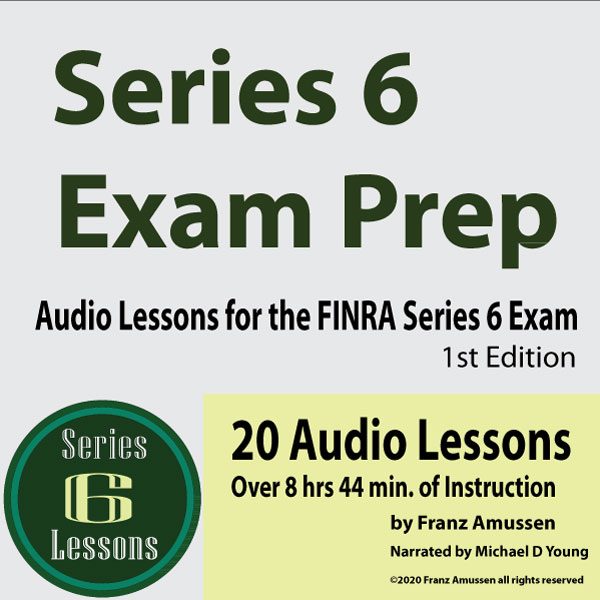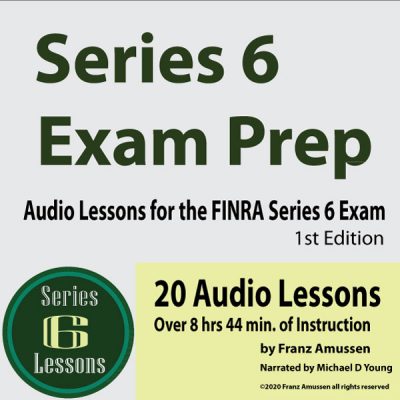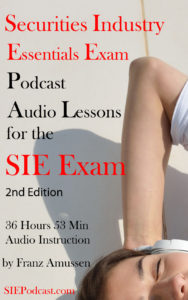Series 6 Lesson 11 Investment Risk
Series 6 Lesson 11 Investment Risk is the topic covered in this lesson.
In a savings account, the only risk is that your money will lose purchasing power. This is known as purchasing power risk that comes from inflation. These affect fixed-income investments the most, because the amount remains the same, while the purchasing power of the money may decline.
Capital risk means investing money and possibly losing your investment.
Systematic risk is something that affects securities in general, such as natural disasters.
Interest rate risk means that there is a risk that your interest rate will change, making you lose value of your securities. The longer a bond’s duration, the more chance it has for the interest to change.
Unsystematic risk is something that affects only certain bonds or sectors. This sometimes comes because government regulates a particular sector or industry and so it only affects that part of the market. This is one of the reasons it is a good idea to diversify your investments. If all of your investments are in the same industry, an unsystematic risk will cause a much larger effect on your investments.
A business risk happens when you invest in a company. This means you do not know how the business is going to perform. They may become obsolete, they might experience a labor strike, or they might be crushed by a large competitor.
Legislative/Regulatory risk means that laws or regulations can change that negatively impact your investments.
Natural event risk is the risk from things like storms and sickness outbreaks.
Call risk is the risk that a bond will be called up sooner than expected when interest rates are down.
Prepayment risk happens during mortgage-backed securities when the mortgages that are backing it are paid back sooner than expected.
Extension risk means that it sometimes takes longer for people to pay off than expected.
Currency exchange risk comes if you are trading with other currencies besides the dollar, because the strength of currencies can change relative to each other.
Political risk comes from investing in developing/emerging markets where financial markets are underdeveloped/immature and so are more volatile than established markets.
Credit risk means that there is a risk that the bond issuer will not be able to pay the interest or return the principal and so may default on the loan.
Liquidity risk means that some investments are easy to turn into cash, such money market securities, and some investments are not, such as selling real estate, which takes a long time to liquidate.
Opportunity cost is how much the cost of a missed opportunity is going to cost you. If you could have made a 4% profit on a transaction, but you passed it up, this is a 4% opportunity cost.
IPO = Initial public offering, which is the first time a company sells stock to investors. Securities are issued to customers in the primary market and then they are traded among investors in the secondary market. Often, they are sold for a lower price on the primary market and then sold for a higher price on the secondary market.
Those who create an IPO have to file a registration statement with the SEC. This shows what is going to be told to investors in the prospectus. It needs to give a thorough overview of the company and its history, and be written in plain, understandable language. Investors have to be able to understand the potential risks and rewards of investment. If not, the company can get a deficiency letter from the SEC and be required to revise their materials.
After the registration statement has been filed, there is a cooling off (waiting) period of at least 20 days. The company can gather statements of interest during this time, but they cannot yet sell anything to anyone. They can send out draft prospectus documents that do not include the effective date or the final public offering price (POP). After this period, the SEC steps back and does not endorse or discourage the company in any way. Government securities are exempt from the Securities Act of 1933. They are known as exempt securities.
You can also offer a limited private placement, which means that you do not sell to the whole world, but to a smaller group of investors, and in this case, you are also exempt from SEC oversight. This is because SEC protections are to help protect the typical, unsophisticated or experienced investor from being taken advantage of. Private placements are only sold to sophisticated, well-funded investors who can accept more risk.
Up to 35 private shares can be sold to non-accredited investors, but if they are sold in this way, the investor needs a purchaser representative to advise him or her whether or not they are making a good investment.
There are people who are considered restricted persons, who are not allowed to buy newly issued shared of common stock. These include member firms and their owners, broker-dealer personnel, finders, accountants, attorneys, portfolio managers for institutions. Also, immediate family members, who receive material support. This rule only covers IPOs and not things that come later.
Series 6 Lesson 11
We also offer lessons for:
The Series 7 Exam
https://gumroad.com/l/ILYu
The Series 22 Exam
https://series6lessons.com/series-22-exam/
The Series 63 Exam
https://series6lessons.com/series-63-exam-lessons/
The Life Health Insurance Exam
https://series6lessons.com/insurance-lessons/
The SIE Exam (Securities Industries Essentials Exam)
https://series6lessons.com/finra-sie/
Click on any of them to find out more
Podcast: Play in new window | Download (Duration: 10:51 — 4.5MB)
Subscribe: Apple Podcasts | RSS | Subscribe to Podcast




